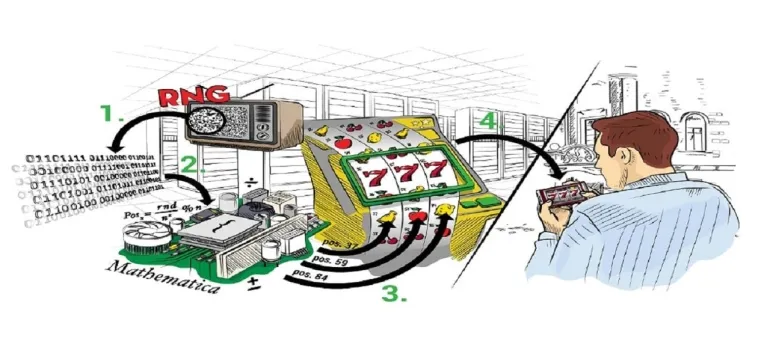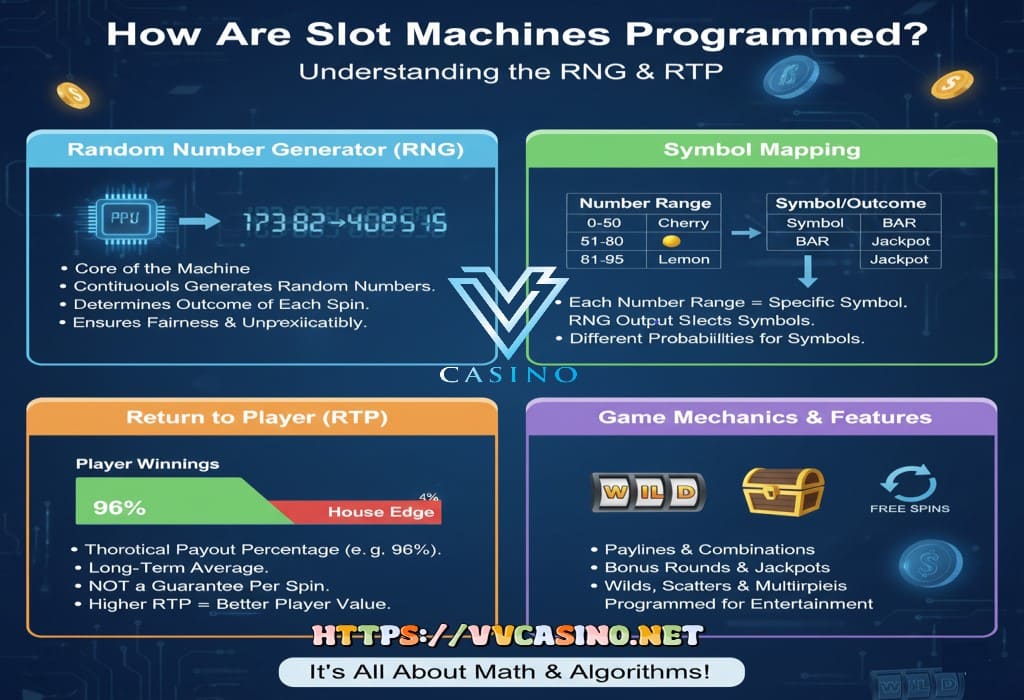
The slot machine is a marvel of modern engineering and mathematics. It represents the pinnacle of casino entertainment, generating billions annually worldwide. Yet, despite their widespread popularity, many players still harbor misconceptions about what drives the reels. Understanding the true mechanisms—the how do slot machines work question—is the key to becoming a smarter player and demystifying the jackpots.
Forget the old mechanical gears and levers; today's games, especially online slot machines, are governed entirely by sophisticated software. We will dive deep into the brain of the slot machine, exploring the algorithms that ensure fair play, determine the payout frequency, and ultimately decide when the next big win will strike. This knowledge is essential whether you’re sitting at a physical terminal or enjoying the latest titles at a Top Rated Slot Casinos.
How Do Slot Machines Work?
At the core of every modern slot machine—from the simplest three-reel classic to the most complex video slot—lies a technology called the Random Number Generator (RNG). This is the heart and soul of the game, making the answer to how do slot machines work surprisingly simple: they are purely determined by mathematics and randomness.
The Random Number Generator Slots is not a physical device; it's a complex, high-speed algorithm running constantly, even when no one is playing. Its function is to generate thousands of random numbers per second.
-
Generation: The RNG generates a stream of numbers, each corresponding to a specific outcome on the slot’s virtual reel mapping.
-
The Stop: The instant a player hits the "Spin" button, the RNG selects the number that corresponds to the final resting position of each slot reels and paylines.
-
The Result: The game's software translates these numbers into the symbols you see on the screen. For example, a random number might correspond to "Reel 1 stops on a Cherry, Reel 2 stops on a Bar, Reel 3 stops on a Jackpot symbol."
Crucially, the RNG is completely independent and memory-less. It has no knowledge of past spins, how much money has been deposited, or how long it’s been since the last payout. Every spin is an isolated event, ensuring fairness. This is the absolute truth that debunks all slot machine myths, such as the belief that a cold machine is "due" to hit. When you play real money slots, you are simply taking a snapshot of the RNG's constant calculations.
How Are Slot Machines Programmed?

The programming of a slot machine is a careful balance between providing exciting gameplay and adhering to strict legal requirements regarding fairness and returns. The most important concept in this programming is the Return to Player (RTP) percentage.
RTP Slots and the House Edge
The how are slot machines programmed question is fundamentally answered by the RTP. The RTP is the long-term, theoretical payout percentage of all the money that is wagered on the game.
-
A game with an RTP slots value of 96% is programmed to pay back 96 cents for every dollar wagered over hundreds of thousands of spins.
-
The remaining 4% is the house edge slots (also known as the theoretical hold percentage), which is the casino's guaranteed profit over the long run.
Game developers program the frequency of symbols, the size of payouts, and the hit rate of bonus features to meet this predetermined RTP target. To achieve this, programmers utilize the virtual reel mapping. While a physical reel might have 20 stopping points, the virtual reel used by the RNG can have hundreds of stopping points. This allows the programmer to weight the virtual reel heavily toward lower-paying symbols, while still making the jackpot symbol appearances possible, but rare, ensuring the RTP target is met.
Understanding Slot Volatility
Another critical aspect of programming is slot machine volatility (or variance). This determines the style of the payout, not the overall RTP.
| Volatility Type | Payout Style | Risk Level |
| Low Volatility | Small, frequent wins | Low |
| High Volatility | Large, infrequent wins | High |
A programmer can adjust the payout structure to create a high-volatility game (few small wins, but a huge top prize) or a low-volatility game (many small, frequent wins) while maintaining the exact same RTP. This gives players a choice based on their risk tolerance and bankroll size when they search for best payout slots.
How Do Slot Machines Pay Out?
The final piece of the puzzle is understanding how do slot machines pay out once the RNG has determined a win. Payouts are governed by the interplay between the reels, the paytable, and the feature triggers.
Paylines and Winning Combinations
The slot machine's software checks the results generated by the RNG against the active slot reels and paylines to identify a winning combination.
-
Bet Verification: The system first confirms that the winning symbols fall across a payline that the player has activated (by betting on it) or one of the game's ways to win configurations.
-
Paytable Match: The symbols are then matched against the game's paytable. For example, three "Cherry" symbols on an active payline might award 5x the line bet, while five "Diamond" symbols might award 1,000x the line bet.
The Progressive Jackpot Mechanism
The mechanics of a progressive jackpot differ slightly. Progressive jackpot mechanism involves linking a small percentage of every bet made across all linked machines (sometimes hundreds of online slot machines worldwide) into a single, massive prize pool.
-
When a player meets a pre-set condition (often a specific symbol combination on a max bet), the RNG randomly triggers the jackpot payout.
-
This win resets the jackpot to its seed amount, and the accumulation process starts all over again.
In essence, when you play real money slots, you are participating in a global network of calculations, all governed by the transparent, yet unpredictable, nature of the rng slots explained programming. There are no slot machine secrets to uncovering a guaranteed win; only strategic play, proper bankroll management, and the understanding that in the short run, anything can happen—which is the excitement of online slot machines. The knowledge of the RTP and volatility, however, offers the best insight into the long-term understanding slot odds.
FAQ
The Random Number Generator (RNG) is an algorithm that constantly produces random results. It's vital because it ensures every single spin is independent of the previous one, making the game purely random and preventing manipulation or predictability, which is key to how do slot machines work.
RTP slots (Return to Player) is the percentage of all money wagered that is returned to players over time (the long-term payout). Slot machine volatility refers to the frequency and size of the wins (risk level), but does not change the long-term RTP.
No. Because the Random Number Generator slots runs thousands of calculations per second and the result is locked the instant the spin button is pressed, neither the player nor the casino can predict the outcome. This is why slot machine myths about patterns are false.
The progressive jackpot mechanism is triggered when the RNG produces a specific, extremely rare combination of numbers that corresponds to the jackpot-winning result, provided the player has met the required betting criteria (often a max bet).
The core principles are identical: both use an RNG slots explained to determine the outcome and are programmed to a specific RTP slots. The difference lies only in the hardware; physical machines use a chip-based RNG, while online slot machines use server-based software.
Virtual reel mapping is a programming technique where a digital reel has more stopping points than a physical reel appears to have. This allows programmers to precisely control the probability of certain symbols appearing, ensuring the desired RTP slots and understanding slot odds are met without making the reel look disproportionate.
The house edge slots and the theoretical hold percentage are synonymous. They represent the guaranteed percentage of all wagers that the slot machine is programmed to keep over the long run. If the RTP is 96%, the house edge/theoretical hold percentage is 4%.
The biggest slot machine myths debunked by the RNG are that machines go through "hot" and "cold" cycles, that you should play at certain times of day, or that a large number of losses means a win is imminent. The RNG ensures that every spin is a fresh, random, and independent event.
More slot reels and paylines generally mean more complexity and more potential ways to win. Classic slots have 3 reels and 1 payline; modern online slot machines often feature 5-6 reels and offer 243, 1024, or even more ways to win configurations, which are more exciting for players searching for best payout slots.
For long-term play on play real money slots, the RTP slots is the single most important factor. Always prioritize machines with a higher RTP (96%+) over others, as this offers the best understanding slot odds for retaining your bankroll over an extended period.



